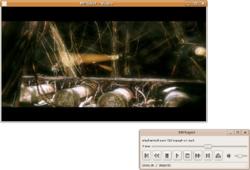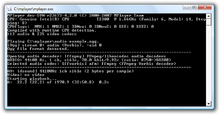- MPlayer
-
This article is about the open source media player. For Microsoft's media player (mplayer2.exe), see Windows Media Player. For the online gaming community, see MPlayer.com.
MPlayer 

MPlayer on Linux using the gMplayer front-endDeveloper(s) MPlayer team Initial release 2000 Stable release 1.0rc4 (January 29, 2011) [+/−] Preview release SVN (SVN) [+/−] Written in C Platform Cross-platform Available in English, Hungarian, Polish, Russian and Spanish Type Media player License GNU General Public License Website www.mplayerhq.hu MPlayer is a free and open source media player. The program is available for all major operating systems, including Linux and other Unix-like systems, Microsoft Windows and Mac OS X. Versions for OS/2, Syllable, AmigaOS and MorphOS are also available. The Windows version works, with some minor problems, also in DOS using HX DOS Extender. A port for DOS using DJGPP is also available.[1] A version for the Wii Homebrew Channel has also emerged.[2] It has also been ported to run on the Amazon Kindle.[3]
Contents
Capabilities and classification
MPlayer supports a wide variety of media formats[4] and can also save all streamed content to a file.
A companion program, MEncoder, can take an input stream or file and transcode it into several different output formats, optionally applying various transforms along the way.
History
Development of MPlayer began in 2000. The original author, Árpád Gereöffy (known as A'rpi / Astral in the demoscene), was soon joined by many other programmers. The project was started because A'rpi was unable to find any satisfactory video players for Linux after XAnim stopped development in 1999.[5] The first version was titled mpg12play v0.1 and was hacked together in a half hour using libmpeg3 from http://www.heroinewarrior.com/. After mpg12play v0.95pre5, the code was merged with an AVI player based on avifile's Win32 DLL loader to form MPlayer v0.3 in November 2000.[6] In the beginning most developers were from Hungary, but currently the developers are located worldwide. Alex Beregszászi has maintained MPlayer since 2003 when Árpád Gereöffy left MPlayer development to begin work on a second generation MPlayer. The MPlayer G2 project is currently abandoned, and all the development effort is put on MPlayer 1.0.[7]
MPlayer was previously called "MPlayer - The Movie Player for Linux" by its developers but this was later shortened to "MPlayer - The Movie Player" after it became commonly used on multiple operating systems.
Supported media formats
MPlayer can play almost anything, including:[8]
- Physical media: CDs, DVDs, Video CDs
- Container formats: 3GP, AVI, ASF, FLV, Matroska, MOV (QuickTime), MP4, NUT, Ogg, OGM, RealMedia, Bink
- Video formats: Cinepak, DV, H.263, H.264/MPEG-4 AVC, HuffYUV, Indeo, MJPEG, MPEG-1, MPEG-2, MPEG-4 Part 2, RealVideo, Sorenson, Theora, WMV, Bink
- Audio formats: AAC, AC3, ALAC, AMR, DTS, FLAC, Intel Music Coder, Monkey's Audio, MP3, Musepack, RealAudio, Shorten, Speex, Vorbis, WMA, Bink
- Subtitle formats: AQTitle, ASS/SSA, CC, JACOsub, MicroDVD, MPsub, OGM, PJS, RT, Sami, SRT, SubViewer, VOBsub, VPlayer
- Image formats: BMP, JPEG, MNG, PCX, PTX, TGA, TIFF, SGI, Sun Raster
- Protocols: RTP, RTSP, HTTP, FTP, MMS, Netstream (mpst://), SMB, ffmpeg:// (Uses FFmpeg's protocol implementations)
MPlayer also supports a variety of different output drivers for displaying video, including VDPAU, the X video extension, OpenGL, DirectX, Direct3D, Quartz Compositor, VESA, Framebuffer, SDL and rarer ones such as ASCII art and Blinkenlights. It can also be used to display TV from a TV card using the device tv://channel, or play and capture radio channels via radio://channel|frequency.
Since version 1.0RC1, reasonable built-in support for the ASS/SSA subtitle format is present by the use of libass, though it still has issues rendering some languages (such as those requiring complex text layout such as Arabic).
Supported plugins
Front-ends
MPlayer is a command line application which has different optional GUI front-ends for each of its supported operating systems. Commonly used GUIs are gMplayer and Gnome MPlayer written in GTK+, KMPlayer written in Qt, MPlayer OS X Extended (for Mac OS X) and MPUI-hcb (for Windows). Cross-platform GUIs are also available, like SMPlayer (Windows and Linux), UMPlayer,[9] etc. Several other GUI front-ends are also available for each platform.
Legal issues
Most video and audio formats are supported natively through the libavcodec library of the FFmpeg project. For those formats where no open source decoder has been made yet MPlayer relies on binary codecs. It can use Windows DLLs directly with the help of a DLL loader forked from avifile (which itself forked its loader from the Wine project).
The combination of CSS decryption software and use of formats covered by software patents places a fully functional MPlayer in the legal bind shared by most open source multimedia players. In the past MPlayer used to include OpenDivX, a GPL-incompatible decoder library. This has since been removed, making MPlayer use only GPL-Like or BSD-like licenses. Usage of patented codecs in free software however is a still pending potential problem affecting FFmpeg, MPlayer and similar software when used in countries where software patents apply.
In January 2004 the MPlayer website was updated with an allegation that the Danish DVD player manufacturer, KISS Technology, were marketing DVD players with firmware that included parts of MPlayer's GPL-licensed code. The implication was that KISS was violating the GPL License, since KISS did not release its firmware under the GPL license. The response from the managing director of KISS, Peter Wilmar Christensen, countered that the similarities between the two pieces of code indicate that the MPlayer team had in fact used code from KISS's firmware.[7] Notably, the KISS DVD player used a subtitle file format that is specific to MPlayer. This may make Mr. Christensen's statement seem improbable, because that subtitle file format was proposed and invented by an MPlayer developer in 2001 and not released to the public until it was incorporated into the MPlayer code, whereas the KISS player was released two years later in 2003.[7]
See also
References
- ^ http://www.ibiblio.org/pub/micro/pc-stuff/freedos/files/util/user/mplayer/
- ^ http://hackmii.com/2008/08/libdi-and-the-dvdx-installer/
- ^ http://gitorious.org/kindlebrew
- ^ http://www.mplayerhq.hu/DOCS/codecs-status.html
- ^ http://xanim.polter.net/
- ^ Appendix D. History
- ^ a b c "MPLAYERHQ THE MOVIE PLAYE(via the Wayback Machine)". 2004-01-10. Archived from the original on 2004-04-09. http://web.archive.org/web/20040409075342/http://www6.mplayerhq.hu/design6/news.html. Retrieved 2008-11-14.
- ^ http://www.mplayerhq.hu/design7/info.html
- ^ "UMPlayer: New Cross-Platform MPlayer GUI Based on SMPlayer". WebUpd8. 01-04-2011. http://www.webupd8.org/2011/04/umplayer-new-cross-platform-mplayer-gui.html. Retrieved 16-08-2011.
External links
- Official website
- #mplayer IRC channel on Freenode
Categories:- Free media players
- Free video software
- Linux DVD players
- Linux media players
- Amiga media players
- Mac OS X media players
- SVGAlib programs
- Windows media players
- GTK media players
- Cross-platform software
- Free software programmed in C
- Free music software
- Portable software
- Software derived from or incorporating Wine
Wikimedia Foundation. 2010.

